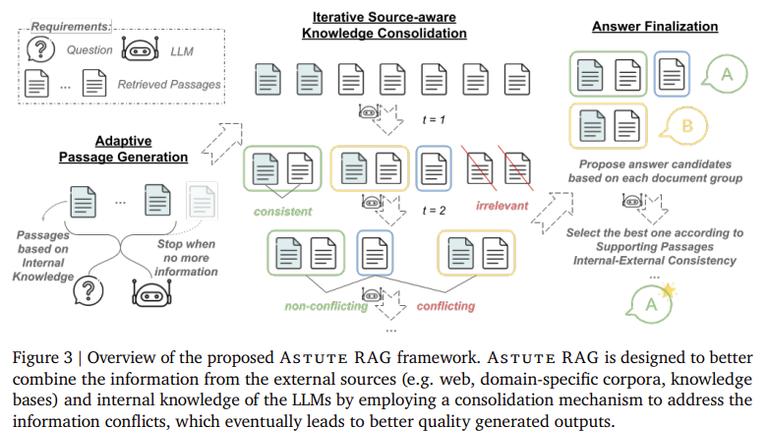When RAG systems retrieve external data, there is always the risk of pulling in irrelevant, outdated, or malicious information. A major challenge associated with RAG is the issue of imperfect retrieval. This issue can lead to inconsistencies and incorrect outputs when the LLM attempts to merge its internal knowledge with flawed external content. For example, studies have shown that up to 70% of retrieved passages in real-world scenarios do not directly contain true answers, resulting in degraded performance of LLMs with RAG augmentation. The problem is exacerbated when LLMs are faced with complex queries or domains where the reliability of external sources is uncertain. To tackle this, the researchers focused on creating a system that can effectively manage and mitigate these conflicts through improved consolidation mechanisms.
Traditional approaches to RAG have included various strategies to enhance retrieval quality and robustness, such as filtering irrelevant data, using multi-agent systems to critique retrieved passages or employing query rewriting techniques. While these methods have shown some effectiveness in improving initial retrieval, they are limited by their inability to handle the inherent conflicts between internal and external information in the post-retrieval stage. As a result, they need to catch up when the quality of retrieved data could be better and consistent, leading to incorrect responses. The research team sought to address this gap by developing a method that filters and selects high-quality data and consolidates conflicting knowledge sources to ensure the final output’s reliability.
Researchers from Google Cloud AI Research and the University of Southern California developed Astute RAG, which introduces a unique approach to tackle the imperfections of retrieval augmentation. The researchers implemented an adaptive framework that dynamically adjusts how internal and external knowledge is utilized. Astute RAG initially elicits information from LLMs’ internal knowledge, which is a complementary source to external data. It then performs source-aware consolidation by comparing internal knowledge with retrieved passages. This process identifies and resolves knowledge conflicts through an iterative refinement of information sources. The final response is determined based on the reliability of consistent data, ensuring that the output is not influenced by incorrect or misleading information.
The experimental results showcased the effectiveness of Astute RAG in diverse datasets such as TriviaQA, BioASQ, and PopQA. On average, the new approach achieved a 6.85% improvement in overall accuracy compared to traditional RAG systems. When the researchers tested Astute RAG under the worst-case scenario, where all retrieved passages were unhelpful or misleading, the method still outperformed other systems by a considerable margin. For instance, while other RAG methods failed to produce accurate outputs in such conditions, Astute RAG reached performance levels close to using only internal model knowledge. This result indicates that Astute RAG effectively overcomes the inherent limitations of existing retrieval-based approaches.
The research’s key takeaways can be summarized as follows:
In conclusion, Astute RAG addresses the critical challenge of knowledge conflicts in retrieval-augmented generation by introducing an adaptive framework that effectively consolidates internal and external information. This approach mitigates the negative effects of imperfect retrieval and enhances the robustness and reliability of LLM responses in real-world applications. The experimental results indicate that Astute RAG is a solution for tackling the limitations of existing RAG systems, particularly in challenging scenarios with unreliable external sources.

Hello.
We would appreciate it if you could avoid copying and pasting or cross-posting content from external sources (full or partial texts, video links, art, etc.).
Thank you.
If you believe this comment is in error, please contact us in #appeals in Discord.